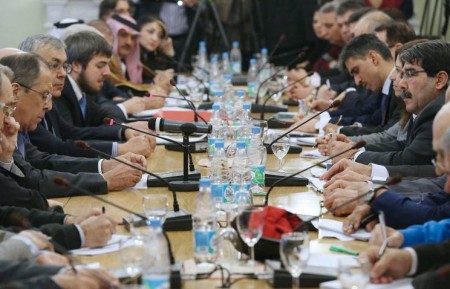Russia’s high-profile “peace” talks finally brought together an Assad regime delegation and some individuals from Syria’s domestic opposition in Moscow on Wednesday.
Syria’s leading opposition groups, inside and outside the country, refused to attend the discussions. Most of those in Moscow are little-known, although the head of the Syrian Kurdish Democratic Party, Salih Muslim, did make the trip. The regime scaled back its involvement, emphasizing that the talks are only preliminary and sending a lower-level team headed by its UN Ambassador, Bashar al-Jaafari.
However, simply putting some people around a table allows State media to play up the meeting, which has been supported by the UN envoy Staffan de Mistura and the US Government. State news agency SANA features the welcoming statement by Russian Foreign Minister Sergei Lavrov: “[These participants] are the ones that truly love Syria because they put its interests above personal considerations and gains and met to find a way to restore peace to their country.”
Other PR boosts come from some of the 34 “individuals” (see list of names) — the Assad regime refused to recognize the presence of any official group — who met Jaafari, a senior Foreign Ministry advisor, and other regime officials.
The nominal opposition representatives said that Damascus has agreed to a “Human Rights Committee”, while the regime group said Assad will consider the release of some political prisoners and asked for a list of names.
Jaafari put out a PR line declaring that President Assad has been open to dialogue from the start of the Syrian conflict and that the regime had “responded to all international peace initiatives, but all of them failed due to interference in internal affairs”. Damascus is also suspicious of some humanitarian organizations working in Syria because of their ties with some opposition groups.
Perhaps most importantly, an unnamed source told Russian journalists that the nominal opposition withdrew the long-standing demand for the immediate establishment of a transitional government and made no reference to the departure of President Assad from power.
Instead, Qadri Jamil, a former deputy Prime Minister who has long been in discussions with Russia about a political “solution” to the crisis, said that the Geneva I agreement of June 2012 for the transitional government is out-of-date: it “has gaps because when it was agreed upon terrorism was not clear to everybody”.
The talks continue on Thursday.

